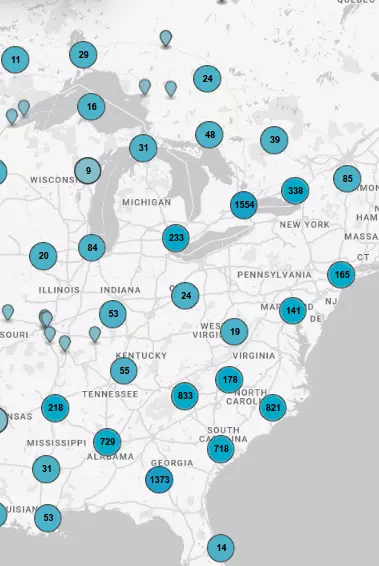Scarborough High School
In 1919, a Board of Trustees was appointed to establish a high school in the southern portion of the Township of Scarborough. 3 hectares were purchased from the Pherrill Estate for $14,000 and on...
- toronto
- ontario
- alan brown
The Studio Building
In 1913-1914, painter Lawren Harris and art patron Dr. James MacCallum financed the construction of the first purpose-built artists' studios and residence in Canada, a building intended to...
- toronto
- ontario
- alan brown
Simpsons Mail-order Warehouse Dalhousie Street Extension
This landmark industrial complex was built in stages between 1916 and 1950. Over the course of the twentieth century, the buildings functioned as the administrative centre and warehouse for...
- toronto
- ontario
- alan brown
Sir William Campbell 1758-1834
Campbell was born near Caithness, Scotland. He fought with the British forces during the American Revolution and was taken prisoner at Yorktown in 1781. Three years later he was practising law...
- toronto
- ontario
- alan brown
St. Andrew's Church
Designed by Langley & Burke in Gothic style and built of Credit Valley stone, this church was dedicated 17 March 1878. The Rev. Dr. G. M. Milligan, the first Minister, who served here for over two...
- toronto
- ontario
- alan brown
Samuel de Champlain's Journeys Through Ontario
This park beside the Humber River commemorates Étienne Brûlé, one of Samuel de Champlain's protégés in the age of exploration. His story is part of the larger one of Champlain and the...
- toronto
- ontario
- alan brown
Severn's Brewery
On this site stood a 19th-century brewery and malt house that, at its peak, produced 26,500 litres of alcohol per week. Established by John Severn in 1835, the brewery specialized in ale and...
- toronto
- ontario
- alan brown
Saint Joseph's Church, Scarborough
The first Saint Joseph's Catholic Church was one of many small rural churches established in Ontario during the 1850's to serve the needs of the growing Irish Catholic population which had left...
- toronto
- ontario
- alan brown
The Salvation Army Territorial Headquarters
In 1886, only four years after it had come to Canada from England, a young Christian revival movement known as Salvation Army built its Territorial Headquarters for Canada and Bermuda on this...
- toronto
- ontario
- alan brown
St. Anne's Anglican Church
Built in the Byzantine style, St. Anne's was designed by the noted Toronto architect Ford Howland to serve a large and vigorous parish. It was constructed in 1907-08, replacing an earlier building...
- toronto
- ontario
- alan brown
St. Lawrence Hall
St. Lawrence Hall was an important venue for many African Canadian activities in support of abolition and the welfare of refugee slaves in Toronto. It provided an important platform for major...
- toronto
- ontario
- alan brown
Scott-Westney House circa 1861
This house was originally on Sheppard Avenue East. First sold to Stephen Westney, the house was purchased by George Scott in 1887. The Scott family owned it until the 1950s. The vernacular Ontario...
- toronto
- ontario
- alan brown
St. Michael's College
In 1852 this college was established as a Roman Catholic boys' school in the palace of the Right Reverend Armand, Comte de Charbonnel, Bishop of Toronto and a vigorous opponent of the...
- toronto
- ontario
- alan brown
Scarborough's "Golden Mile"
Surrounded by farmland until the 1940s, this stretch of Eglinton Avenue, from Pharmacy Avenue to Birchmount Road, became famous in the 1950s as Scarborough's "Golden Mile of Industry" - a hub...
- toronto
- ontario
- alan brown
See House 1885-86
The official residence the Bishop of the Anglican Diocese (or "See") of Toronto from 1885 until 1935, this house became the administrative centre of Royal St. George's College in 1964. Designed...
- toronto
- ontario
- alan brown
St. Margaret's Church
Scarborough's first Anglican Church was built in 1833 on a .8 ha lot given for a church yard and burying ground by Simon E. Washburn, clerk of the home district and a church warden of St....
- toronto
- ontario
- alan brown
Sir John A. Macdonald 1815-1891
Canada's first Prime Minister was born in Glasgow, Scotland, and immigrated with his family to Kingston, Upper Canada, in 1820. A successful lawyer, he was elected to the provincial legislature in...
- toronto
- ontario
- alan brown
The Second Invasion of York 1813
On the morning of July 13, 1813, a U.S. invasion fleet appeared off York (Toronto) after having withdrawn from a planned attack on British positions at Burlington Heights. That afternoon 300...
- toronto
- ontario
- alan brown
Stanley Barracks
The British army established a military post here in 1840-41 to replace aging Fort York. Known as the New Fort, it consisted of seven limestone buildings around a parade square, and a number...
- toronto
- ontario
- alan brown
St. Lawrence Hall
Designed by William Thomas, in the Renaissance tradition, this hall, built by the city in 1850, was for many years Toronto's chief social and cultural centre. With its handsome Corinthian facade...
- toronto
- ontario
- alan brown
